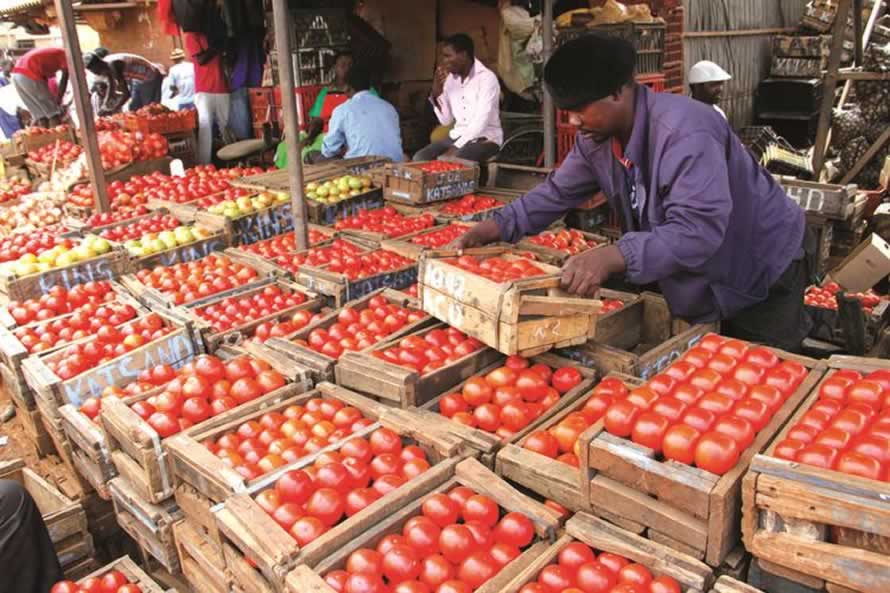
The Sunday Mail

 Tomato supply stood at over 1 404 tonnes in January this year and increased to 1 813 tonnes in March
Tomato supply stood at over 1 404 tonnes in January this year and increased to 1 813 tonnes in MarchWhile it is now clear that Zimbabweans are able to produce diverse crops and keep many types of livestock, value-addition remains a tough nut to crack.
If the majority of farmers are to double horticulture production, a glut in Mbare and other fresh produce markets around the country will throw many farmers out of business. In fact, this is already happening during certain periods of the year. Tomato supply stood at over 1 404 tonnes in January this year and increased to 1 813 tonnes in March. This trend is likely to continue since farmers have switched from field crops to winter horticulture.
Given Zimbabwe’s record of high post-harvest losses, the same tonnage is probably destroyed before reaching the market. If value-addition was fully embraced, much of this produce would be processed, thereby encouraging farmers to continue producing. Onion supply was 356 tonnes in January and went down to 175 tonnes in March.
This supply is likely to remain erratic, giving room to imports from South Africa. Cabbage supply in March was also less than half of the January supply and only started increasing in April. Okra also increased in March.
Commodities worth more than US$2,5 million were traded at the Mbare market between January and March. Leading the pack were potatoes, bananas and onions. With supplies hovering above five tonnes, red pepper was also traded in significant volumes. Other markets in Bulawayo, Mutare, Kwekwe, Gweru, Zvishavane, Chinhoyi, Bindura and Masvingo also continued to absorb high quantities of horticulture commodities, some of which should have been processed into diverse products.
Agriculture markets as determinants of value
The true value of agriculture can only be seen at the market where high value commodities separate themselves from the rest. However, very few farmers produce with a specific market or consumer in mind. The assumption is that there is a buyer somewhere. Since the majority of farmers have this mindset, most farmers are often disappointed when confronted with market gluts. The dumping of processed products like tomato puree in Zimbabwe is destroying local agro-processing efforts and affecting many farmers.
To get a sense of how far we have regressed on the value-addition front, it is important to examine what has happened to some food processing firms.
Fresca (located in Mt Hampden, Harare) stopped operating a few years ago. The firm used to dry various types of vegetables – cabbages, onions, carrots, peppers, butternuts and tomatoes – into a wholesome nutritious vegetable product. About 70 percent of this product was for Nestle Zimbabwe, which used it to produce baby food while about 15 percent was exported. The remainder was consumed locally.
The demise of Fresca has negatively affected farmers who are now forced to search for alternative markets. Another agro-processsing company that has been dormant for years is Zagrinda, located in Norton.
The firm required 90 tonnes of tomatoes per run for its huge machinery. Although many farmers are producing tomatoes, mobilising them to produce 90 tonnes of the same quality per day has remained a nightmare, especially with farmer organisations showing little interest and capacity in building strong commodity associations.
Zim Tomato, located in Msasa, used to dry tomatoes for export and domestic consumption. At its peak, it could take 120 tonnes of tomatoes daily.
Following the company’s demise, a former foreman is now buying and selling tomatoes at the Mbare market.
Cairns used to produce tomato puree with raw materials from Cashel Valley and other sources. Although there are efforts to recapitalise it, the firm has stopped operating viably. Lyons used to process tomato puree for export to Malawi and other countries but it is no longer in that sort of business.
Firms that have stopped agro-processing include Flue Pack, Muchero Wholesalers and Kutapira, among others. The only processor that has soldiered on is Chegutu Canners. The company is still contracting farmers to produce jam tomatoes for processing. However, the firm is still grappling with viability challenges.
Some of the factors that have contributed to the death of local horticulture processing companies include imported tomato puree that lands into Zimbabwe at half the cost of local processing.
Another factor is inconsistent supply from farmers due to the failure of farmer organisations and processing companies to build a strong, consistent grower base. Recurring problems like post-harvest losses require fresh strategies.
Besides defining the situation, we should sort out the right value-addition strategies, otherwise, Zimbabwe will continue to be on the receiving end of foreign-processed food when we have valuable raw materials. Our porous borders have to be fixed as part of a sustainable solution.



